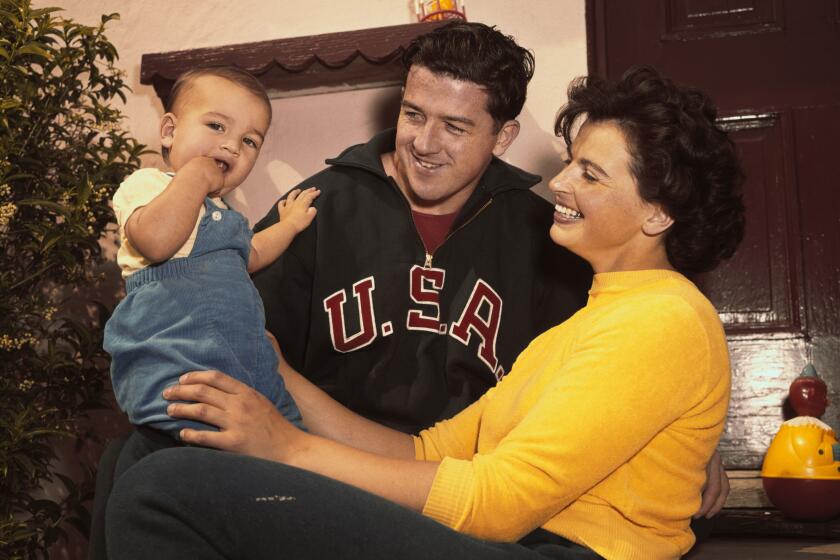VOLLEYBALL, ANYONE? : Promoter Tries to Net Bigger Following With Team Cup Concept
Sports promoter Mike O’Hara, who helped give the world the American Basketball Assn., the World Hockey Assn., the International Track Assn. and Wallyball (volleyball played on a racquetball court), is at it again.
Professional volleyball is O’Hara’s newest venture, and he’s approaching it with the zeal of an evangelist.
“I’m a missionary of sports,” O’Hara said. “I may be masochistic, but I enjoy it (starting new sports leagues) a great deal.”
O’Hara’s baby is the Team Cup Volleyball League, which will end its second season next week.
Volleyball is his first love. A member of the 1964 U.S. Olympic team, O’Hara played on UCLA’s first National Collegiate Athletic Assn. championship volleyball team and said he had an important role in getting UCLA to make it an official intercollegiate sport.
And now he’s trying to bring the sport he loves to the masses.
It’s going to be a tough sell.
O’Hara isn’t exactly a flake. He was a member of the Los Angeles Olympic Organizing Committee, and said that he’s serving as a consultant to the 1988 Games in Seoul, South Korea.
He founded Team Cup Volleyball with Jerry Buss, owner of the Lakers, Kings and Lazers.
“Jerry Buss and I had been talking about doing something together for a long time,” O’Hara said. “I love volleyball, and it fits into the summertime because the best players in the world are available to us.”
Buss didn’t go in with O’Hara just because he likes volleyball.
Buss was looking for summer programming for Prime Ticket, his two-year-old cable TV network.
Plus, he also needed events to keep the Forum busy during the summer. The Forum sells about 2,000 Senate seats, which entitle the ticket-holder to attend every event at the Forum.
Thus, Team Cup Volleyball was born.
This isn’t the first time promoters have tried to organize an indoor volleyball league.
But other pro volleyball leagues, such as the one organized by Wilt Chamberlain several years ago, failed, possibly because they tried to do too much too fast.
O’Hara and Buss, who have made a five-year commitment to Team Cup Volleyball, are taking a limited format, figuring small is better.
The Team Cup Volleyball League is composed of four six-man teams, with a schedule that runs for three consecutive weeks in mid-September. The matches, held on Tuesday and Thursday nights, are played at the Forum and televised on a delayed basis by Prime Ticket.
Team Cup Volleyball doesn’t have Magic Johnson, but it does have Karch Kiraly, who last year was named the world’s best player by the Federation of International Volleyball.
Kiraly, who recently turned down a $125,000 offer to play in a semi-pro league in Italy for six months because he wanted to retain his eligibility for the ’88 Olympics, is one of 9 U.S. Olympians and 12 U.S. national team members who compete in the league.
Why would Kiraly turn down such a lucrative offer?
“I think it’s too important for volleyball in this country,” Kiraly said. “I’d like to see the sport become more popular. By going over to Italy, it’s like I’d be giving up on American volleyball. I figured I should put my money where my mouth is.”
Last year teams had both men and women players, but this year it’s all-male. O’Hara said the format was changed because most of the top women players were unavailable.
The league depends on money from TV and corporate sponsorships to survive.
“TV and sponsorships are the mother’s milk of sports,” O’Hara said. “This was developed as a TV concept. Otherwise, we’d hold it in a 3,000-seat arena.”
O’Hara said a major sponsorship costs a little less than $100,000, with team sponsors paying $25,000 to $50,000.
Great Western Bank is the league’s major sponsor. James F. Montgomery, the bank’s chairman, played on UCLA’s national championship volleyball team with O’Hara in 1956.
O’Hara said that the bank has made a five-year commitment to sponsor the league.
Although attendance is up a bit from last season, the crowds would fit into a high school gym.
The league is averaging 2,085 this season, compared to 1,496 last season.
The fans are seeing the top players in the United States
“If you took all the volleyball players we have out there we’d probably have $850,000 to $1 million in talent on the floor tonight,” Buss said. “That’s a million-dollar show going on tonight, which you can enjoy for not that much. You’ll never see that much talent together again.
“Volleyball is not that popular now, but one day I feel it will be,” Buss added.
The four teams sponsors are: Sheraton Hotels, Maui and Sons clothing company, radio station KLSX and Circuit City.
“We haven’t made money so far,” Buss said. “We had to put up half the prize money last year and we lost $50,000 last year. This year, I think we’ll either lose a little or make a little.”
Buss’ daughter, Jeanie, is the executive director of Team Cup Volleyball.
Jeanie, who also is in charge of the Forum’s tennis operation, has become a volleyball convert.
She attended Palisades High, which has one of the top prep volleyball programs in the nation, but never went to a volleyball game. However, she says she loves the sport now.
‘I’m really happy with the way things have gone with the league,” she said. “I think the growth we experienced has made me feel all my long nights have been worth it.
“Promoting this is a lot different than tennis. Everybody knows John McEnroe, but everybody doesn’t know Karch Kiraly.
“But I know I can sell this sport. I’ve fallen in love with it. I’ve become the best salesman for the game. It’s exciting and clean. You don’t have foul-mouthed players, and there haven’t been any drug scandals in volleyball.”
Buss said she’s also had inquiries from Madison Square Garden and arena operators in Dallas and Denver interested in starting pro volleyball leagues.
The Forum will also play host to the USA Cup volleyball tournament next month. In addition to the top-ranked U.S. national team, the other teams in the USA Cup are the Soviet Union, which is No. 2 in the world, No. 3 Argentina and No. 6 France.
The floor used in Team Cup Volleyball is the same as the one used in the 1984 Olympics, at the Long Beach Arena.
Hoping to capitalize on the success of America’s 1984 gold medal winning volleyball team, Team Cup Volleyball has attracted virtually all of the top indoor and beach volleyball players in the United States. The players are available for 16 days in September.
There’s a total of $100,000 in prize money.
Amateur players can compete in the league and still retain their eligibility because the money goes into a trust fund.
“The money is good,” said Steve Timmons, volleyball MVP of the 1984 Olympics. “Volleyball players aren’t paid like a Carl Lewis. Almost everyone is groveling for money.”
Kiraly, MVP of Team Cup Volleyball last season, said the league provides a good outlet for volleyball’s elite players.
“I think it’s a great idea because few players are good enough to make the national team,” Kiraly said. “A lot of guys don’t have the opportunity to move on, and in a limited way this is a good way to keep improving.
“Plus, it’s a good way to keep in shape and earn a little extra money.”
The other Olympians who play in the league are: Timmons, Dusty Dvorak, Dave Saunders, Aldis Berzins, Steve Salmons, Pat Powers, Craig Buck, and Rod Wilde.
The top four beach volleyball players also compete in Team Cup Volleyball:
Sinjin Smith, Randy Stoklos, Mike Dodd and Tim Hovland.
Kiraly, Timmons, Dvorak and Smith were selected as team captains, and they filled their teams though a draft of players who had applied to play in the league.
In Team Cup Volleyball, Smith and Stoklos, the best beach volleyball team, play on the same team with Dodd and Hovland, beach volleyball’s second-best team.
Smith, who said he’ll earn close to $100,000 on the beach volleyball circuit and from endorsements, said he plays in the league to help promote the sport.
“I do it for volleyball rather than for the money,” Smith said. “We make a lot more money playing on the beach, and there is a good chance of getting injured here. On the beach you have to be an all-around player, but this (indoors) is much more specialized.
“Playing indoors makes it tougher on me to play on the beach. Playing on the beach is like running a marathon every week. This actually makes it more difficult. You don’t want to go back to the beach and practice. But the thing about this is that it’s good for volleyball.
“Volleyball is growing very fast all over the world. It’s second only to soccer. And it seems to me it will catch on here.”
O’Hara has made two key rules changes in Team Cup Volleyball.
Instead of using the normal side-out scoring system, where a team must serve to score points and the winner must score 15 points, O’Hara has devised an alternate system.
Each game in Team Cup Volleyball is played to 30 points, with a point being awarded to the winning team in each rally. However, conventional side-out scoring is used once a team gets to 27 points.
The three-meter line has also been moved to four meters.
O’Hara said he experimented with the rules to jazz up the games for TV and the fans and to create longer rallies.
O’Hara said the International Volleyball Federation, volleyball’s world governing body, is studying the rules changes.
Said Kiraly: “I like the idea of trying to even out the advantage that the offense has. I think the long rallies are more exciting for the fans.
“If anything it (the four-meter line) makes backcourt players less involved in the game. I don’t know any players able to spike from 13 feet. They’ve legislated out some of the best backcourt hitters.
“The scoring system makes it more exciting for fans because every point brings you closer to the end of the game. In side-out scoring you could get stuck for 10 minutes on one point.”
So what’s next for Team Cup Volleyball?
“It would be hard to expand, but each year we want to make it better,” O’Hara said. “Next year we hope to have the Team Cup series right after the Olympics.”
More to Read
Go beyond the scoreboard
Get the latest on L.A.'s teams in the daily Sports Report newsletter.
You may occasionally receive promotional content from the Los Angeles Times.




